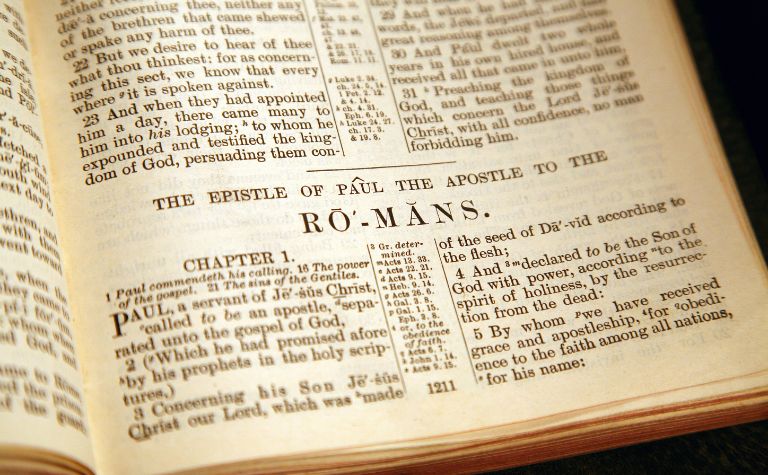Romans is one of the most influential books in the New Testament, creating converts, launching movements, and fueling the Church’s most powerful preachers. Its arguments are crisp and logical; its theology is rich and practical. The letter is the product of one of the most passionate, intelligent, and faithful followers of Jesus Christ who ever lived. So who is the author of the book?
Paul of Tarsus, follower, and Apostle of Jesus Christ, wrote the book of Romans. The first verse mentions his name, and the biographical sections of the letter align with his life and ministry. Additionally, scholars have near unanimous agreement that Paul is the letter’s author.
Why are some scholars skeptical of the authors named in biblical books? What is an amanuensis, and why would an author use one? Who is Tertius, and what role did he have in the letter’s composition? Did Romans have two different authors? Keep reading to learn the answers to these questions and others.
Also, see Who Wrote Acts in the Bible? to learn more.

Paul, the Undisputed Author of Romans
Paul identifies himself in the verse of Romans: “Paul, a servant of Christ Jesus, called to be an apostle, set apart for the gospel of God” (ESV). Regarding some books of the New Testament, an author’s name in the introductory paragraph isn’t sufficient for scholars to conclude that that’s who the real writer is.
Some scholars are skeptical of named writers because faking authorship was a way to attract readers in the ancient world. Or, in other cases, a disciple of the named author may have been responsible for the letter, and they use their mentor’s name because the content reflects their teaching. However, this isn’t the case with Romans.
Most scholars believe Paul wrote Romans
The vast majority of scholars, both ancient and modern, attribute the authorship of Romans to Paul with the help of an amanuensis (more below). Very few scholars today question Paul’s authorship of the letter, and those that do, don’t agree on who did and don’t have many (if any) followers.
Bible scholars agree that Paul wrote Romans, and they seldom take other arguments for authorship seriously because they aren’t persuasive and lack evidence. Three examples from well-reviewed commentaries on Romans show this is the case.
(1) “No serious scholar today doubts that Paul wrote Romans… Pauline authorship is one of the assured results of NT scholarship, and thus further discussion on this issue is unnecessary.” [1]
(2) “Hardly anyone doubts that this letter was written by Paul. In fact, the universal acceptance of Pauline authorship has always been one of the most assured results of modern scholarship.” [2]
(3) “Although it has been fashionable in the last century and a half to challenge the traditional authorship of many books of the Bible, there has never been any serious doubt about the authorship of this epistle. Hence, Pauline authenticity of Romans remains a matter of virtual certainty.” [3]
Surveying reference books on Romans shows that commentators rarely include discussion on authorship because the topic isn’t worthy of it. Whereas in commentaries on other books like 2 Peter, Revelation, and Hebrews, the debate of authorship can require dozens of pages.
So who is Tertius, and what is an amanuensis? Keep reading to learn more.
Also, see Who Wrote Hebrews in the Bible? to learn more.

Who Was Tertius?
Romans 16:22 reads, “I Tertius, who wrote this letter, greet you in the Lord” (ESV). In the same verse, the NIV says Tertius “wrote down” the letter. Yet Romans 1:1 identifies Paul as the author: “Paul, a servant of Christ Jesus, called to be an apostle, set apart for the gospel of God.” Is this a contradiction?
The statements about Paul and Tertius aren’t in conflict. Instead, Romans 16:22 reveals that Tertius was Paul’s amanuensis or secretary. In the ancient world, it was common for letter “writers” to dictate their message while a scribe wrote down their words.
The sender (i.e., the speaker) was the source of the letter, making them the “author” of its content (i.e., Rom. 1:1). The amanuensis, like a secretary, recorded what they said. In addition, it was the practice of some amanuenses to sign their name at the end of letters, as Tertius does in Romans 16:22.
Also, see Who Wrote Revelation in the Bible? to learn more.

Why did Paul use an amanuensis?
The reason why senders used amanuenses varied. Some were poor and illiterate and needed someone to write for them. Others were wealthy and hired professional scribes to record their messages.
Why Paul used an amanuensis isn’t stated in the text. Since he was literate, that possibility can be ruled out. And he likely wasn’t wealthy. Some scholars speculate that his poor eyesight prevented him from seeing well enough to write, so he required a recorder.
1 Corinthians 16:21 reads, “I, Paul, write this greeting with my own hand,” implying that an amanuensis wrote the rest of the letter. Similarly, Galatians 6:11 reads, “See with what large letters I am writing to you with my own hand.” See Colossians 4:18, 2 Thess. 3:17, and Philemon 19 for more examples.
Did Tertius take liberties in his writing?
Amanuenses’ sometimes had a small degree of liberty when recording a speaker. They were different from a stenographer in a modern courtroom who only writes down what is said, but they didn’t have the freedom to add, subtract, or clarify a letter’s content.
One New Testament scholar explains: “While Paul may sometimes have given his amanuenses some freedom in choosing the wording of his letters, there is little evidence that this was the case in Romans. A few have wondered if parts of Romans may have been written by someone else and incorporated into the letter by Paul, but none of these theories has proved convincing.” [4]
Also, see Who Wrote Proverbs in the Bible? to learn more.
Reference:
[1] Romans by Thomas Schreiner. BENCT. p. 2.
[2] Romans by Grant Osborne. IVPNTC. p. 13.
[3] Romans by James Edwards. NIBC. p. 5.
[4] Introduction to the New Testament by D.A. Carson and Douglas Moo. p. 393.
Related Questions
Regular Bible reading is a valuable habit, as Scripture is God's message to people. However, the Bible's 66 distinct books, featuring various authors, settings, and themes, can make it challenging...
There are 66 individual books in the Bible. There are 39 in the Old Testament and 27 in the New Testament. Many readers can read the shortest books in the Bible in 5 to 10 minutes. The longest book...
